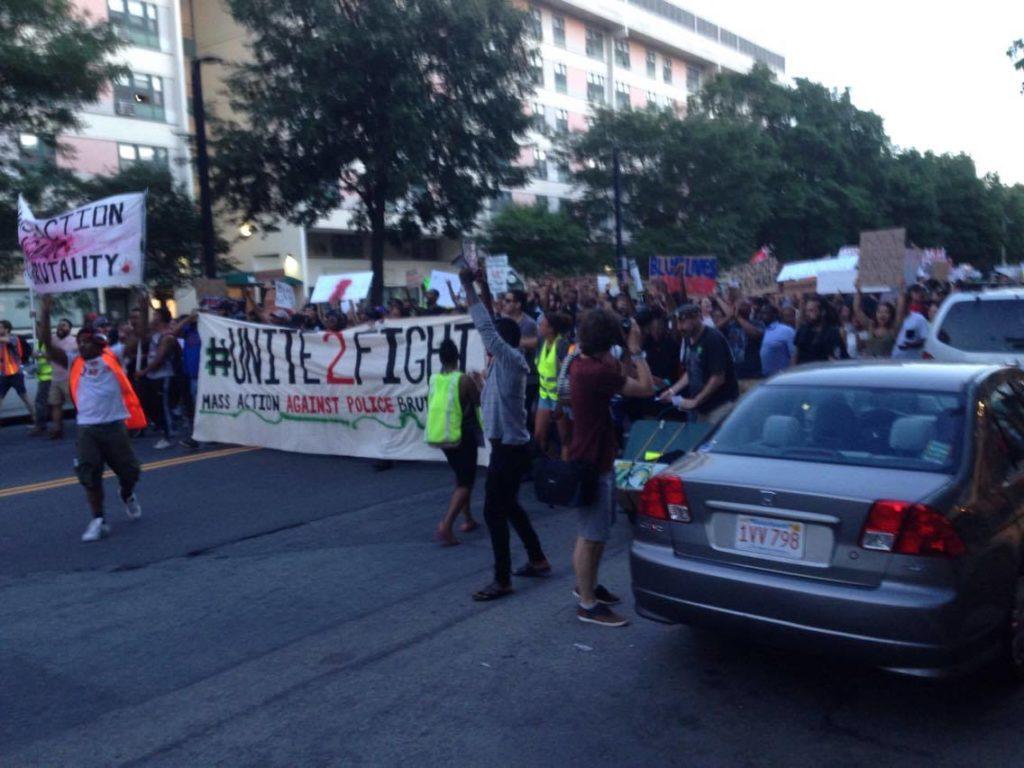By Pamela Stravitz, news correspondent
A close-knit ring of protesters, signs held above their heads, swayed outside the Boston Police Department (BPD) headquarters on Wednesday, July 13. The group’s leader, sporting a megaphone, began a call-and-response chant.
“We’ve got unity,” the protesters chanted to a crowd of several hundred. “No more immunity for killing our community.”
That evening, on the anniversary of the death of Sandra Bland, more than 1,000 people participated in a Black Lives Matter protest sponsored by the Mass Action Against Police Brutality.
The crowd marched through Roxbury and the South End, rallying residents who saw the protest outside their windows. Though some believed that marching through other neighborhoods could have better supported the cause, protesting was important, according to Brandeis University African American and Afro American studies senior Nyah Macklin.
“This walk is to get the Boston Police Department (BPD) to understand [police brutality] is not a joke and cannot be taken lightly,” she said.
Those at the march called for a new idea to create justice in a system that hasn’t been working for all populations and to convict police officers who use deadly force.
BPD issued a statement saying that officers from several different divisions will begin wearing body cameras on a volunteer basis, on Tuesday, July 12. The department hopes to have these in place by the end of August and, if the six month trial runs smoothly, to outfit all officers with body cameras.
Approximately nineteen percent of the city’s $2.97 billion budget will go to public safety for the 2017 Fiscal Year, according to the city’s website. Some of that funding will go towards the new body cameras. Costs other than the cameras themselves, including film storage and extra staff to review the footage, will put the total expense of this project in the millions.
“I think the cameras are irrelevant if you can turn them off and if the system doesn’t change,” said Macklin. “We’ve had video before and what has that done?”
Others believe that issuing the body cameras is a step in the right direction, but not enough to create justice in the system.
“The cameras will allow us to see the problem more clearly, but they won’t create justice,” said Northeastern senior political science major Jaisun Lewinski. “Until we change this from a social, cultural and educational standpoint, we are going to keep creating people who are ignorant to this problem.”
Some protesters implored reform in law enforcement, noting technical difficulties that can occur with body cameras.
“Sometimes, the cameras aren’t focused or on. I would like to see police trained in a way other than deadly force,” said Peggy Barrett, 65. “Currently, [most police forces] cut back on training—deadly force only. I’d rather invest in better training.”
The protest isn’t to offend law enforcement officials, but rather urge change and equal justice, said Lewinski.
“A lot of police departments take it personally as an affront on individuals, but that’s not what Black Lives Matter is about,” he said. “Instead of having policies that show [injustice] we need consequences.”
Photos by Sam Haas, news staff

















